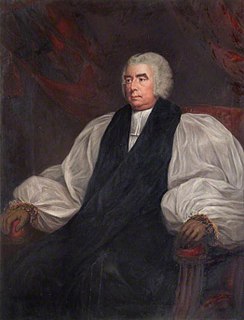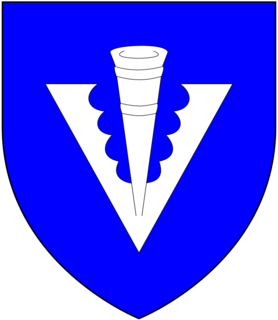Related Research Articles
Richard Senhouse was an English churchman, Bishop of Carlisle from 1624 to 1626.

Arthur Bell, OFM was an English Franciscan martyr. He was found guilty of being a Roman Catholic priest by a court sitting under the auspices of Parliament during the English Civil War. He was executed at Tyburn in London. Bell was beatified by Pope John Paul II on 22 November 1987.
Robert Tounson — also seen as “Townson” and “Toulson” — was Dean of Westminster from 1617 to 1620, and later Bishop of Salisbury from 1620 to 1621. He attended Sir Walter Raleigh at his execution, and wrote afterwards of how Raleigh had behaved on that occasion.
Zouch Tate (1606–1650) was an English Member of Parliament.

Samuel Goodenough was the Bishop of Carlisle from 1808 until his death in 1827, and an amateur botanist and collector. He is honoured in the scientific names of the plant genus Goodenia and the red-capped robin. In addition, William Kirby's 1802 book on the bees of Engand, page 182, mentions, in Latin, that the cuckoo bee Nomada goodeniana is named after Goodenough with the following words:
A viro Reverendo S. Goodenough, LL. D. Canonico Windsoriensi, Botanico summo tum et in Entomologia lynceo, nomen suum haec Apis mutuatur.
Arthur Yeldard (c.1530–1599) was an English clergyman and academic, chosen as the first Fellow and second President of Trinity College, Oxford.
Augustine Lindsell was an English classical scholar and Bishop of Hereford. In church matters he was advanced by Richard Neile, and was a firm supporter of William Laud. As a scholar he influenced Thomas Farnaby.
Matthew Nicholas (1594–1661) was an English Dean of St. Paul's Cathedral, London.
Charles Croke was an English clergyman and Gresham Professor of Rhetoric.

William Bradbridge (1501–1578) was an English bishop of Exeter.
John Rawlinson was an English churchman and academic who was Principal of St Edmund Hall, Oxford from 1610.

Edmund Ashfield was an English portrait painter and miniaturist, who worked in both oils and pastels.

Arthur Duck, Doctor of Civil Law (LL.D.) was an English lawyer, author and Member of Parliament.
William Agutter was an English sermon writer and preacher.

Sir John Hewley (1619–1697) was an English magistrate and Member of Parliament for Pontefract, an early Whig. He sided with parliament against the king. After his death his widow, Sarah Hewley founded the Hewley Trust in 1705, now known as the Sarah Hewley Trust.
Robert Scott was a Scottish engraver.
James Bell was an English reformer.
References
- 1 2 3 4 "Bell, William". Oxford Dictionary of National Biography (online ed.). Oxford University Press. doi:10.1093/ref:odnb/2030.(Subscription or UK public library membership required.)
- 1 2 3 . Dictionary of National Biography . London: Smith, Elder & Co. 1885–1900.
- Attribution
 This article incorporates text from a publication now in the public domain : "Bell, William (fl.1599)". Dictionary of National Biography . London: Smith, Elder & Co. 1885–1900.
This article incorporates text from a publication now in the public domain : "Bell, William (fl.1599)". Dictionary of National Biography . London: Smith, Elder & Co. 1885–1900.